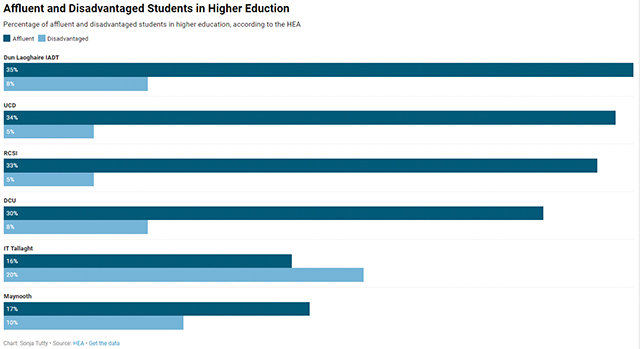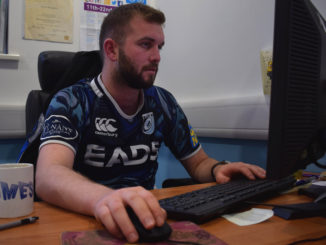
[dropcap]S[/dropcap]tudents from affluent backgrounds are far more likely to study high-point courses, according to a recent study.
The research carried out by the Higher Education Authority found that courses such as medicine, business, engineering and finance have much higher proportions of affluent students while agricultural, social work, environmental and childcare programmes have larger numbers of students from “disadvantaged” backgrounds.
The study, which is the first of its kind, included all publicly funded institutions in Ireland apart from Trinity College Dublin who declined to take part due to data protection concerns which have since been resolved.
The Institute of Art, Design and Technology in Dún Laoghaire has the highest number of students from affluent areas enrolled, making up 35 per cent of their student body. The institute is followed closely by The Royal College of Surgeons in Ireland (RCSI) and also UCD with enrolments mostly coming from the South Dublin Region.
The Letterkenny Institute of Technology has the highest proportion of students from disadvantaged areas at 24 per cent with enrolments primarily coming from Donegal.
Overall, universities have a much higher proportion of affluent students enrolled, while institutes of technologies are more likely to reflect the social profile of the national population.
The study found that the socio-economic profile of the student body at the Institute of Technology Blanchardstown (which is now a part of Technological University Dublin) “most closely mirrors that of the national population”.
The research also looked into the salaries of recent graduates from third level institutions.
It found that despite studying the same course in the same institutions, students from affluent backgrounds earn up to 30 per cent more than their peers who come from less advantaged areas of the country.
It also revealed that students who graduate from universities earn more than those who graduate from institutes of technologies.
Catríona Ryan, Head of Access Policy at HEA, said she is satisfied with the institutions efforts so far to fix this issue:
“We know that our higher education institutions are committed to increasing equity of access to higher education and have made significant progress over time,” she said.
Ryan said that the efforts by third level institutions have been proven in the Progress Review of the National Access Plan. This plan showed that more students from DEIS schools are progressing to higher education and students from “disadvantaged CSO socio-economic groups” are showing higher education participation.
Ryan said that these statistics show “progress towards enhanced equity of access”.
According to the study by the authority, 20 percent of DCU’s student body comes from “affluent” areas and eight percent come from more disadvantaged areas.
With regards to DCU, the university claims to maintain “a strong tradition of creating equality of access to third level education for students from groups currently under-represented in higher education” through their ACCESS programme.
Jonathon Lynam, a final year Journalism student here in DCU, is grateful for what the ACCESS Programme has done for him.
“The Access scheme has helped me out financially through the scholarship which has helped cover my travel costs to and from college as well as any other college expenses,” he said.
Currently in DCU there are 1,300 students on the ACCESS programme and last year 252 students on the ACCESS programme graduated from the university with a higher honours degree.
Megan Jones
Image Credit: Sonja Tutty



